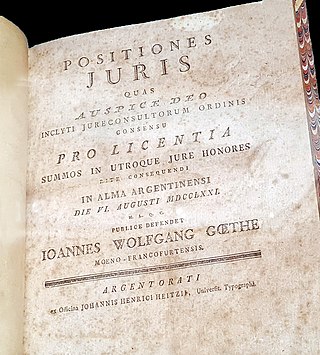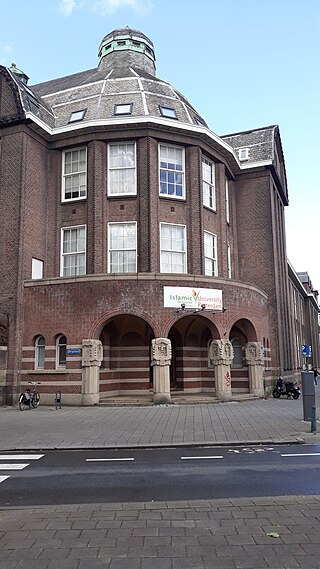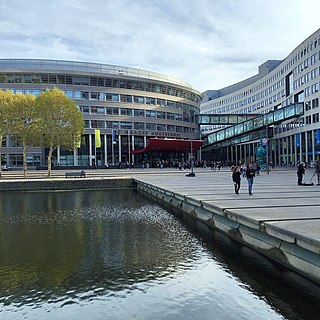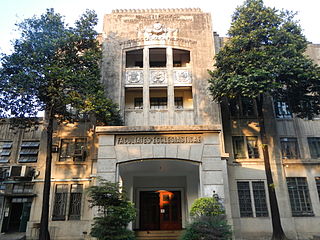
The Vrije Universiteit Brussel is a Dutch and English-speaking research university located in Brussels, Belgium. It has four campuses: Brussels Humanities, Science and Engineering Campus, Brussels Health Campus, Brussels Technology Campus and Brussels Photonics Campus.

Radboud University (abbreviated as RU, Dutch: Radboud Universiteit, formerly Katholieke Universiteit Nijmegen) is a public research university located in Nijmegen, the Netherlands. It is considered one of the best traditional, general universities in the Netherlands. RU has seven faculties and more than 24,000 students.

A licentiate is an academic degree present in many countries, representing different educational levels. It may be similar to a master's degree when issued by pontifical universities and other universities in Europe, Latin America, and Syria.
Vesalius College, also known as VeCo, is a college in Brussels, Belgium. The college was founded in 1987 and it is named after Andreas Vesalius, one of the pioneers in the study of anatomy who lived during the Renaissance period.

Education in Belgium is regulated and for the most part financed by one of the three communities: Flemish, French and German-speaking. Each community has its own school system, with small differences among them. The federal government plays a very small role: it decides directly the age for mandatory schooling and indirectly the financing of the communities.

The Flemish Diamond is the Flemish reference to a network of four metropolitan areas in Belgium, three of which are in the central provinces of Flanders, together with the Brussels-Capital Region. It consists of four agglomerations which form the four corners of an abstract diamond shape: Brussels, Ghent, Antwerp and Leuven.
Dutch universities are supported by state funding so that universities do not have to rely on private funding to pay for tuition. All citizens of the Netherlands who complete high school at the pre-academic level (vwo) or have a professional Propedeuse at HBO level, signifying they have finished their first year course, are eligible to attend university. In the case of a HBO-Propedeuse some restrictions may apply as to deficiencies in High School subjects. Three universities have restrictive requirements based on academic ability; and all universities have restrictive requirements for some of their programs because the number of prospective students sometimes outnumbers the number of available places.

The Islamic University of Applied Sciences Rotterdam is a vocational university founded in 1997. It is a member of the Federation of the Universities of the Islamic World. The Islamic University of Applied Sciences Rotterdam received her first accreditation in 2010 for her master's degree programme Islamic Spiritual Care (Chaplaincy) and in 2013 for Bachelor program Islamic Theology; both degree programmes are accredited by the NVAO. According to a news article from 2010 the university has close religious ties with the Turkish Nurcu movement. The IUASR offers accredited Bachelors and master's degrees and is called Islamic University of Applied Sciences Rotterdam.
The education in the Flemish Community covers the Dutch-speaking part of Belgium and consists of three networks (netten): government-provided education (gemeenschapsonderwijs), subsidized public schools and subsidized free schools.

The Hague University of Applied Sciences is a university of applied sciences with its campuses located in and around The Hague in the Randstad metropolitan region in the west of the Netherlands. The city is home to the Dutch government, royal family and many major international legal, security and peace institutions. Since the university was founded in 1987 it has expanded to four campuses in the near-side cities of The Hague, Delft and Zoetermeer. The main campus in The Hague is located behind The Hague Hollands Spoor railway station by the Laakhaven Canal.
Science and technology in Flanders, being the Flemish Community and more specifically the northern region of Belgium (Europe), is well developed with the presence of several universities and research institutes. These are strongly spread over all Flemish cities, from Kortrijk and Bruges in the Western side, over Ghent as a major university center alongside Antwerp, Brussels and Leuven to Hasselt and Diepenbeek in the Eastern side.
The Accreditation Organisation of the Netherlands and Flanders is the independent educational accreditation organisation for higher education institutions in the Netherlands and Flanders. It was established by international treaty by the Dutch government and the Flemish government in Belgium, for the purpose of ensuring the quality of higher education in the Netherlands and Flanders by accrediting study programmes.
Hotelschool The Hague is a single sector university of applied sciences in the Netherlands. It was founded and funded in 1929 by the hospitality industry. In 2010, Hotelschool The Hague founded its university wide Research Centre, focusing on interdisciplinary research with a strong practice-oriented focus.
Wittenborg University of Applied Sciences is a Dutch government accredited Vocational University established 1987 in the centre of the Netherlands, offering bachelor's and master's degrees - vocational education - at higher level.

The Leuven Faculty of Theology was a branch of the Catholic University of Leuven, founded in 1834 in Mechelen by the bishops of Belgium as the Catholic University of Belgium, that moved its seat to the town of Leuven in 1835, changing its name to Catholic University of Leuven.

The University of Santo Tomas Faculties of Ecclesiastical Studies are the ecclesiastical schools of the University of Santo Tomas, the oldest and the largest Catholic university in Manila, Philippines.

Ede Christian University of Applied Sciences is a Christian vocational university located in Ede, Netherlands. The CHE has a clear Christian basis: the Bible as norm and source of inspiration.
Jan Lambrecht was a Belgian Catholic priest of the Society of Jesus, Professor Emeritus of New Testament and Biblical Greek at the Faculty of Theology and Religious Studies, KU Leuven, Belgium and a member of the Pontifical Biblical Commission. As a theologian, biblical scholar, and prolific author, he contributed numerous studies on almost all the books of the New Testament, but focused especially on the Gospels and the Pauline letters. His publications included books and articles written in English, Dutch, and French.










